The vigilante cyclists of San Jos: ‘Civil society has to be a trailblazer’
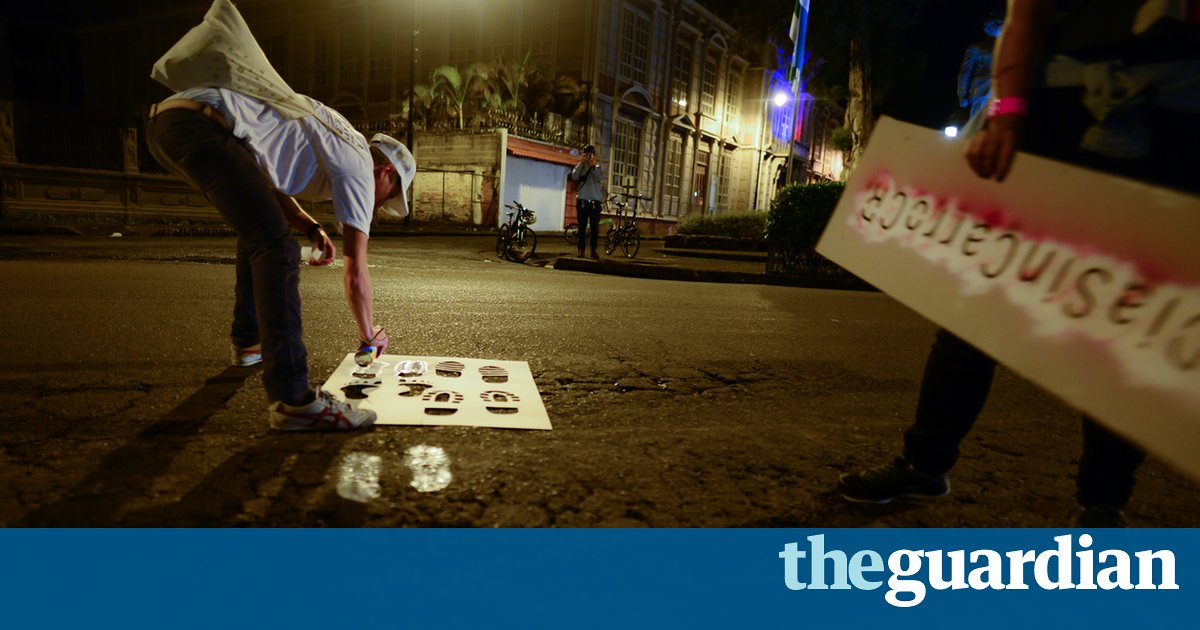
Tired of government bureaucracy and traffic jams, activists in Costa Ricas capital are solving the citys transport problems themselves: painting crossings, funding research and even building infrastructure
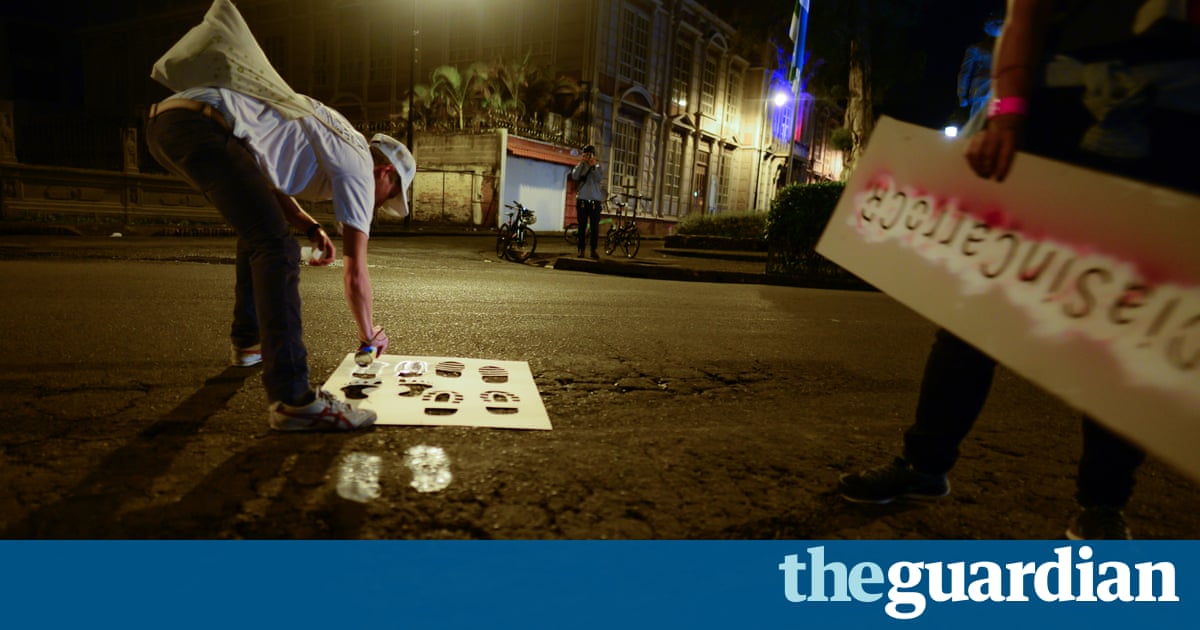
Four cyclists flashing safety lights stand out from the yellow din of San Joss street lamps. Its almost 11pm and save for a few revellers staggering out of a bar, the group is alone in the heart of the Costa Rican capital. The sound of their brakes echo across the nearby buildings when they stop suddenly as two policeman eye their cans of spray paint suspiciously.
The cyclists arent your typical vandals, but their intentions do not fall exactly within the margins of the law. Once the police are out of sight, they slap their stencils on the pavement and spray a trail of white footprints across the street, leading to Parque Morazn, one of the citys largest parks. After a few minutes, they have created a makeshift pedestrian crossing, before speeding off into the night.
The next morning San Jos awakes to five illicit walkways spanning the city. Some are indistinguishable from the official crossings, and people begin using them to cross the street. Even now, a week or two later, the walkways are still there, seemingly ignored by authorities, though a little faded.
Here in Costa Ricas sprawling capital, a tangled bureaucracy severely limits the amount of pedestrian infrastructure built by the government. Traffic and infrastructure resources are distributed across so many different branches of government that a cohesive, city-wide system has never formed.
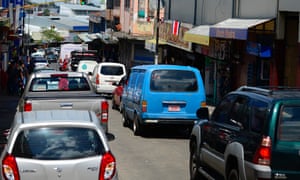
Though the country frequently ranks as one of the happiest countries in the world, Costa Ricans in the greater metropolitan area (GAM) spend as many as 15 days a year trapped in traffic jams, or presas. According to a study by the navigation app Waze, San Jos has the worst traffic (pdf) in all of Latin America. Many people worry that congestion is killing the nations laid back spirit.
Tired of waiting for the government, a growing number of citizen groups are tearing through the red tape themselves: building infrastructure, leading bike tours to educate the population about the city, and funding research on public transportation. The movement is not only changing the way people travel through Costa Ricas cities, but is also pushing forward the countrys stagnant goal to become carbon neutral by 2021 (pdf).
The morning after their vigilante street painting mission, the cycling activists were back on their bikes to promote World Car-Free Day, celebrated for the first time in Costa Rica on 22 September. Along with encouraging people to leave their cars at home, the event organisers planned a bike tour to draw attention to the citys lack of cycling infrastructure.
Chepecletas, the countrys first major urban cycling group formed in 2010, shortly after Costa Rica declared its carbon neutral goal. The group started small, with the aim of hosting nocturnal bike tours in San Jos, to challenge negative perceptions about the city and cycling in general. Aside from dealing with the citys narrow, pothole ridden avenues, Chepecletas had to push back against San Joss bad reputation for crime, filth and a general lack of interesting sites and activities.
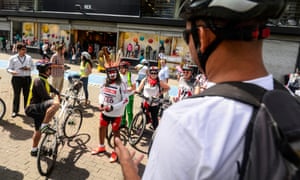
In San Jos you didnt see many people who were proud of their city, says Chepecletas founder Roberto Guzman. In general, the people that come here say very negative things. We wanted to change that.
Also attending car-free day is Liza Castillo, the vice-minister of transportation and public works. She pedals a white cruiser on the bike tour to better understand the challenges faced by San Joss cyclists. Its important to support initiatives for sustainable urban routes, she says. We want to create visibility for this issue.
But if Costa Rica hopes to reach its deadline for carbon neutrality, clean transportation will need much more than visibility. Despite using renewables for nearly all of its electricity, Costa Rica still relies heavily on fossil fuels. Hydrocarbons make up 67% of the countrys energy use (pdf), nearly half of which is used to power private cars.
In part, it is due to the countrys deeply fragmented government structure, which divides the responsibility for transportation in the GAM between three different national ministries, 31 municipal governments and countless consulting boards. Even widely supported ideas, like the transportation ministrys recent plans for a cycleway, often meet a dead end when the government arms fail to coordinate.
The ministry only had the budget to design the path, not to build it, says Josselyne Murillo, one of the engineers who designed the cycleway. It will be built once the municipality has the money.
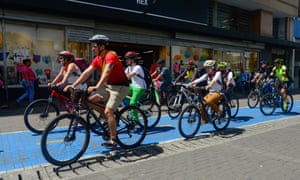
These tasks are now being picked up by civil society. One group, Movete por tu ciudad, conducted studies to produce a plan and cost analysis for a public transport system in the GAM. The groups leader, Teo Mezger, handed over the plans to the transportation ministry free of charge.
We are the ones pushing, Mezger says of the rising number of citizen groups. Its us that are putting pressure and it shows that its the public that will push this forward and get politicians involved.
Another group, Rutas Naturbanas, has taken its vision for the city a step further, towards building actual infrastructure. The group, led by urban planner Federico Cartn, plans to create a 25km trail along the citys two rivers, enabling pedestrians and cyclists to traverse the entire city on a tree-lined path. This year, the project received more than 20,000 signatures of support and the government declared Rutas Naturbanas a project of public interest.
Much like the similar projects attempted by the government, Rutas Naturbanas has hit legal hurdles. The route would span five municipalities and require signed permission from every property owner adjacent to where the path would pass. Despite the challenges, Cartn believes the plan has enough momentum to build 5km per year.
[The future of the city] really depends so much on NGOs, Cartn says. Right now, civil society has to be a bit of a trailblazer.
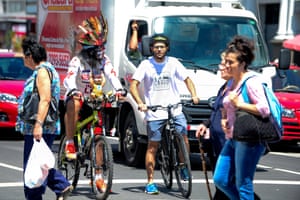
Costa Rica could even begin blazing trails at the global level by renouncing petroleum all together. The environmental group Costa Rica Limpia launched the campaign Petroleum-free Costa Rica, earlier this year, and has already garnered international attention. Costa Rica already has many of the building blocks to reach that goal renewable electricity, little manufacturing and a small population and Costa Rica Limpias president, Monica Araya, believes the political issues are far from insurmountable.
If you look at the world and you look at opposition to clean energy, our problems here seem almost cute, says Monica Araya, the president of Costa Rica Limpia. The government will need to change, but right now it is about changing the hearts and minds of Costa Ricans.
However, at the groups first public forum in August, the event was so popular that the line to get in wrapped around the building. And with the growing influence of civil society groups, it seems Costa Ricas hearts and minds are already open to change.
Join our community of development professionals and humanitarians. Follow @GuardianGDP on Twitter. Follow the conversation on the hashtag #LatAmNow.